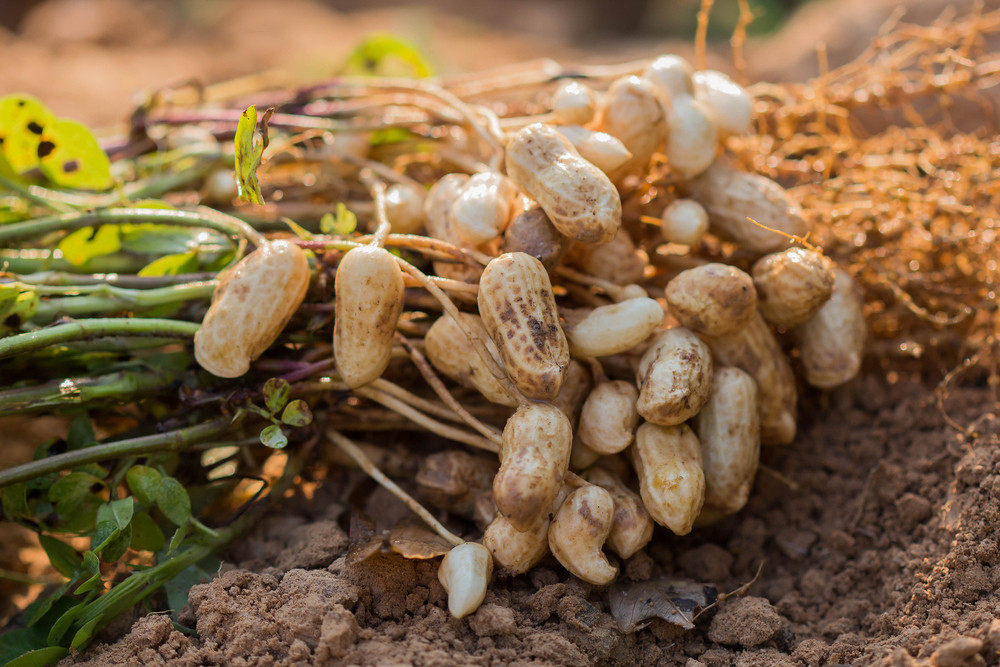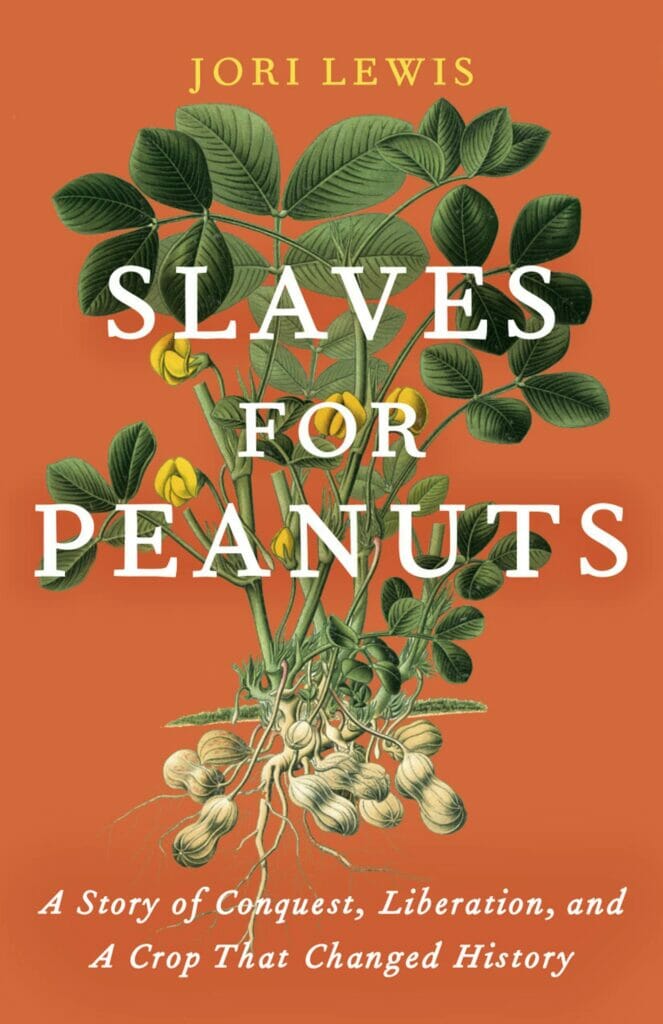Tracing the Link Between Slavery and Peanut Farming
A new book delves into the history of a crop that affected indentured and enslaved people on a global scale.
Tracing the Link Between Slavery and Peanut Farming
A new book delves into the history of a crop that affected indentured and enslaved people on a global scale.

Peanuts and their roots.by benjamas11, Shutterstock.
Most Americans think of peanuts in terms of peanut butter or as a snack at baseball games. The history of peanuts in America, of course, is more complicated than that, and it is often tied to the enslavement of African Americans. However, the history of peanuts in West Africa is perhaps even more complicated.
Although the peanut originated in either Peru or Brazil, Africans were the first to introduce the legume to the United States in the 1700s. Peanuts were often the only food for the enslaved while on ships heading to America. In the earliest days of this country, peanuts were not held in high esteem. They were seen as food for livestock, poor people and the enslaved, even though they could be used for oil and as a substitute for cocoa.
The enslaved were familiar with how to successfully grow peanuts since they were prevalent in West Africa. By the 1800s, peanuts began to grow commercially, particularly in Virginia, although the crop spread throughout the South. By 1860, some farmers found peanuts to be more profitable than cotton. After the Civil War, the stigma against peanuts dissolved, as both Northern and Southern soldiers supplemented their diet with them, leading to an increase in peanut consumption.
Thanks to the contributions of George Washington Carver and the creation of machinery that properly cleaned the peanut plant, the crop spread throughout the country. In the early 1900s, machinery was created to shell and clean peanuts, increasing the demand for peanut butter, roasted nuts, candy and peanut oil.
Carver is widely considered to be the father of the peanut industry. He began researching peanuts at Tuskegee Institute in 1903 and discovered more than 300 uses for them. Carver recognized early on that the peanut would be a valuable cash crop in the Southeast. Because of his work, southern farming changed from focusing on cotton crops to peanuts.
While much about the history of peanuts in America has been explored, there are few references to enslaved peanut farmers in Africa. However, Jori Lewis, author of the new book Slaves for Peanuts: A Story of Conquest, Liberation and a Crop That Changed History, hopes to shed light on that narrative. In the book, the Senegal-based journalist shows how the demand for peanut oil throughout Europe affected indentured and enslaved people on a global scale.

Unfortunately, there are similarities between the enslaved in America and Africa, including stories of the enslaved escaping from their masters and inhumane treatment and safe houses in Africa that parallel the Underground Railroad in America.
In a recent interview, Lewis told Civil Eats that “the peanut is this tool for colonial expansion, but it paradoxically also becomes an instrument for certain people to become free. It was similar in America as well, with kitchen farms for slaves, where they could sell [food] on the side and gain a little money. But because peanuts were grown at such a scale and people were selling them for a meaningful amount of money, some were able to buy their own freedom more quickly than before. And because there was this peanut rush, they could move to other places and acquire land to grow peanuts and would have a way to support themselves.”
The story of peanuts throughout the world is entangled in geopolitics, classism and economics. Perhaps more importantly, peanuts represent a people who against all odds persevered to be considered equals and to live life on their own terms. The struggle to not only survive but to also thrive is embedded in the original African and African American farmers. That struggle continues, but fortunately, the roots for something better have been planted.
Follow us
This work is licensed under a Creative Commons Attribution-NoDerivatives 4.0 International License.
Want to republish a Modern Farmer story?
We are happy for Modern Farmer stories to be shared, and encourage you to republish our articles for your audience. When doing so, we ask that you follow these guidelines:
Please credit us and our writers
For the author byline, please use “Author Name, Modern Farmer.” At the top of our stories, if on the web, please include this text and link: “This story was originally published by Modern Farmer.”
Please make sure to include a link back to either our home page or the article URL.
At the bottom of the story, please include the following text:
“Modern Farmer is a nonprofit initiative dedicated to raising awareness and catalyzing action at the intersection of food, agriculture, and society. Read more at <link>Modern Farmer</link>.”
Use our widget
We’d like to be able to track our stories, so we ask that if you republish our content, you do so using our widget (located on the left hand side of the article). The HTML code has a built-in tracker that tells us the data and domain where the story was published, as well as view counts.
Check the image requirements
It’s your responsibility to confirm you're licensed to republish images in our articles. Some images, such as those from commercial providers, don't allow their images to be republished without permission or payment. Copyright terms are generally listed in the image caption and attribution. You are welcome to omit our images or substitute with your own. Charts and interactive graphics follow the same rules.
Don’t change too much. Or, ask us first.
Articles must be republished in their entirety. It’s okay to change references to time (“today” to “yesterday”) or location (“Iowa City, IA” to “here”). But please keep everything else the same.
If you feel strongly that a more material edit needs to be made, get in touch with us at [email protected]. We’re happy to discuss it with the original author, but we must have prior approval for changes before publication.
Special cases
Extracts. You may run the first few lines or paragraphs of the article and then say: “Read the full article at Modern Farmer” with a link back to the original article.
Quotes. You may quote authors provided you include a link back to the article URL.
Translations. These require writer approval. To inquire about translation of a Modern Farmer article, contact us at [email protected]
Signed consent / copyright release forms. These are not required, provided you are following these guidelines.
Print. Articles can be republished in print under these same rules, with the exception that you do not need to include the links.
Tag us
When sharing the story on social media, please tag us using the following: - Twitter (@ModFarm) - Facebook (@ModernFarmerMedia) - Instagram (@modfarm)
Use our content respectfully
Modern Farmer is a nonprofit and as such we share our content for free and in good faith in order to reach new audiences. Respectfully,
No selling ads against our stories. It’s okay to put our stories on pages with ads.
Don’t republish our material wholesale, or automatically; you need to select stories to be republished individually.
You have no rights to sell, license, syndicate, or otherwise represent yourself as the authorized owner of our material to any third parties. This means that you cannot actively publish or submit our work for syndication to third party platforms or apps like Apple News or Google News. We understand that publishers cannot fully control when certain third parties automatically summarize or crawl content from publishers’ own sites.
Keep in touch
We want to hear from you if you love Modern Farmer content, have a collaboration idea, or anything else to share. As a nonprofit outlet, we work in service of our community and are always open to comments, feedback, and ideas. Contact us at [email protected].by Debra Freeman, Modern Farmer
April 19, 2022
Modern Farmer Weekly
Solutions Hub
Innovations, ideas and inspiration. Actionable solutions for a resilient food system.
ExploreExplore other topics
Share With Us
We want to hear from Modern Farmer readers who have thoughtful commentary, actionable solutions, or helpful ideas to share.
SubmitNecessary cookies are absolutely essential for the website to function properly. This category only includes cookies that ensures basic functionalities and security features of the website. These cookies do not store any personal information.
Any cookies that may not be particularly necessary for the website to function and are used specifically to collect user personal data via analytics, ads, other embedded contents are termed as non-necessary cookies.
Slavery never ended. There could be, yet the so-called Western Nations/Countries depend on some form of enslavement to exist, but people in Africa keep dropping the ball. They want to believe they were not enslaved by Europeans inside of Africa.
Slavery in Africa is alive and well today. Nobody wants to talk about that.